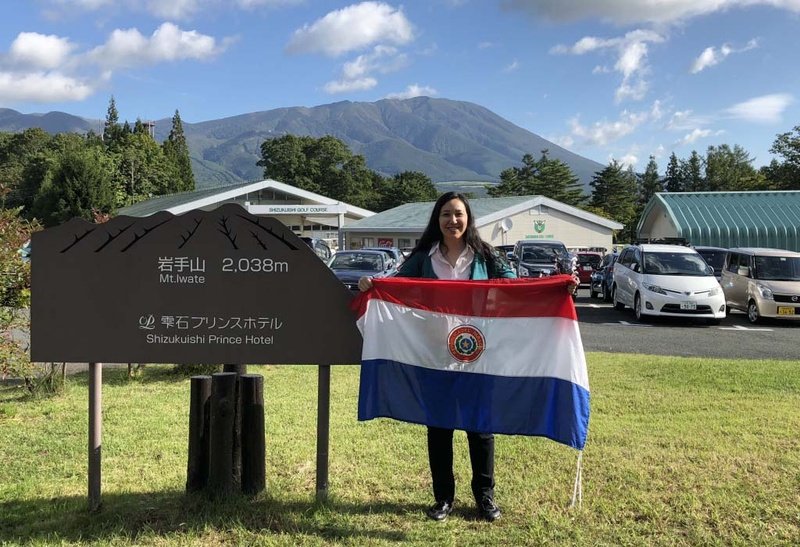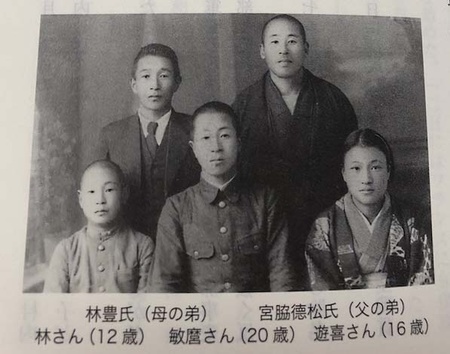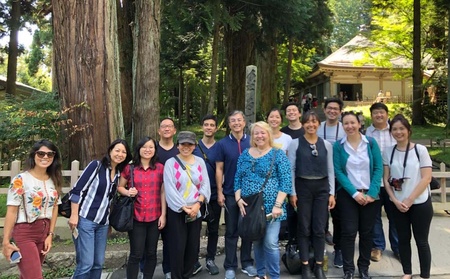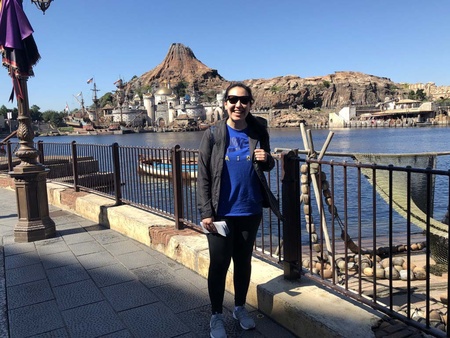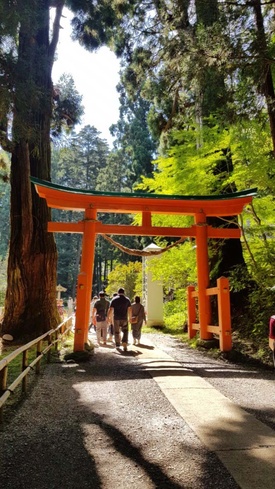"Nice to meet you! “My name is Narumi Akita.”
"As?"
“Na – ru – mi”
“Aaah, and where is your name from?”
"Is Japanese".
“And you speak Japanese?”
“No, unfortunately.”
“And have you already gone to Japan?”
“No, neither.”
*Brief silence, followed by an awkward smile*
* * * * *
It was years of responding the same way every time I met someone for the first time. I even came to the conclusion that my destiny was to be pure name. It's not easy to have an oriental name, slanted eyes and not "do them justice."
A little background
For those who don't know me, I was born in Asunción; My dad is Japanese, my mom is Paraguayan. Their marriage was short-lived. They separated when I turned 2 years old. I grew up with my maternal family. Due to the difficult context surrounding my parents' separation, I was not able to share with my Japanese family as I would have liked.
My grandfather Kaoru passed away when I was 4 years old. And although my grandmother Yuuki lived to be 95, I only had the opportunity to see her on rare occasions. Even so, the love of my Obaachan deeply captured my heart.
Given these circumstances, I grew up without a big piece in the puzzle of my identity; with many unanswered questions; curious about my family history; with a lot of love accumulated and undelivered; with shame and shyness to get involved in the community of Japanese descendants; and missing something I never had.
Despite my interest and longing for Japan, life took me down another path, where I had to look “from a distance,” without even knowing the basic details of how and why it was that decades ago my grandparents, along with my father and my uncle, crossed oceans by boat from Kochi Prefecture to Paraguay.
This is how I grew up, raised and loved by my Paraguayan family, with a silent longing for my Akita-Yamawaki side. Until two events changed everything: a visit and a phrase.
The visit
It was 2016 and it had been 15 years since I had seen my Japanese grandmother. I felt a restlessness in my heart that told me:
“It's time, Naru. You have to visit your grandmother. Arm yourself with courage, overcome all discomfort and reach out to her to tell her how much you missed her all this time and that you love her . “This may be your last chance.”
That's how I visited her at her house in Paraguay. Although she was already very old, her smile and loving eyes were the same as I remembered. His first words were in Japanese amidst sobs, and I didn't understand them but I know they meant something special.
We shared an afternoon that I will treasure forever and that was indeed my last opportunity .
The phrase
In November 2017, a friend invited me to dinner at her house. I exchanged a conversation with his father, which predictably began:
“And you speak Japanese?”
“No, unfortunately.”
“And have you already gone to Japan?”
“No, neither.”
And there Mr. Chihan responded to me in a surprising way:
“ When the time comes when you get off the plane and set foot in Japan… your blood will know.”
He - as a Syrian descendant - had a personal experience that gave him enough credibility to express those words with conviction. That phrase haunted me for months.
I began an internal reflection with thoughts like these:
“Your blood never left you; Your blood has memory, it gives you the credentials. There is no such thing as 'pure name', that is an invention of your mind to get away from something that has been calling you for years. Not only does a red liquid run through your veins, a family legacy runs. You were not born by chance as a mestiza. Do not deny your blood just because the past hurts you and creates uncertainty for the future. An ancient land is waiting for you. It will not be easy. This restlessness will never go away until you dare to cross those 18,000 kilometers of distance and discover what Japan has to reveal to you.”
And I determined...
My first step was to start studying Japanese privately with a Japanese teacher. In addition to language, the classes also included facets of culture. And something was awakening in me that had been anesthetized for years. Each class revitalized me more and I felt challenged. I even set a goal to go to the 2020 Tokyo Olympics, with an iron determination to save.
So…
A month after classes started, I was notified about the opening of applications for a scholarship for Latin American Nikkei by the Ministry of Foreign Affairs of Japan - through the Embassy of Japan in Paraguay - for a 10-day trip. The objective was to learn as much as possible about Japan so that upon returning to their country, each Nikkei would spread the culture and learning through their communication skills. I am a communicator by profession and Nissei, so I met the fundamental requirements. I was encouraged and applied.
In the midst of anxiously waiting to find out if I would be chosen or not, at the end of August 2018 I received the news that my Obaachan left us. With sadness I went to his funeral on a Monday. And there something happened that I didn't expect: my dad introduced me to his cousin - my grandmother's nephew - who had come from Japan for a week. His name: Toshifumi Yamawaki (my grandmother's maiden name). We talked and I told her that if I was selected weeks later I would travel to Tokyo on a scholarship.
As if it were a roller coaster of emotions, two days later they called me from the Consulate of the Japanese Embassy: “Hello Narumi. I have good news to give you…” said the voice on the other end of the phone. I had been selected. To me, the pure name !
That way I would join 14 other Nikkeis from Latin America. I could not believe it. The doors were opening.
On Sunday of that same week I went to say goodbye to Uncle Toshifumi at the airport and we agreed that I would stay 5 more days in Japan after the program finished, in order to learn more about my family roots. This fact made the difference in my trip. I felt like my grandmother gave me one last gift of love, because it was at her departure that I met my uncle.
My Sensei smiled big when he found out. “Why does everything come together now?” I asked him. And he answered: “ Because there is a purpose, Narumi-san.”
Feet in Japan
When the plane was descending to land at Narita airport my legs were shaking. "This is real. It's happening,” I told myself.
And my feet set foot in Japan. They were 15 transformative days.
You don't put together a puzzle mentally, but rather you bring the pieces together so that they touch each other, to check if they fit together. I didn't really know the Japanese people until I made contact with them.
It was only by being there that I spoke their language, so fascinating and difficult. I followed their schedules. I tasted their delicious meals. I saw the delicacy, beauty and order in its presentation. I ate fine dishes in restaurants to obento in supermarkets.
I got around with its impeccable and complex public transportation, including its Shinkansen crossing prefectures at 320km/h.
I had fun with its magical world at Tokyo Disney Sea and its innovative attractions. I saw how the Japanese laugh and how euphoric they can get.
I got informed with your newscasts. I had ocha , sake and umeshu . And I couldn't help but spend all my coins at the vending machine for one more Calpis.
I was surprised by their graphic design style; because of how explicit they are in mangas and animes, and how shy they can be in person.
I entered their temples and sanctuaries. I saw your wishes written there. I watched them raise a prayer. I fell asleep and woke up in their accommodations. I walked its streets and nooks with my transparent umbrella under the light September rain.
I shared with their families, their workers and their leaders. I saw the hierarchy with which they operate and the codes in their interactions.
I visited the Imperial Palace and spent time with the Emperor's family. I had meetings with members of the Cabinet of then Minister Shinzo Abe and with leaders of the diplomatic corps. I learned that not a single detail is left to chance.
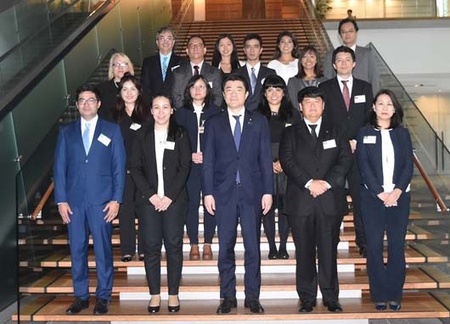
I experienced its humid climate and even a typhoon. I saw the great deployment of technology and artificial intelligence.
I experienced the contrast of walking through the hectic Shibuya intersection, and the peace of doing so through the cool ancient forests of Hiraizumi in Iwate.
I bought at their konbini stores and their super-stores. I saw the beauty of its mountainous landscape; I contemplated his fascinating art; I respected their protocols and rules.
I entered the subway during rush hour and survived to tell the tale. I saw rice fields, skyscrapers and pandas. I learned about an onsen and the Pacific Ocean from the Asian side.
I was in areas devastated by the 2011 tsunami and observed the remains of buildings and schools. I heard moving stories about that day. I contemplated the floral offerings and tributes that still lie in the affected places.
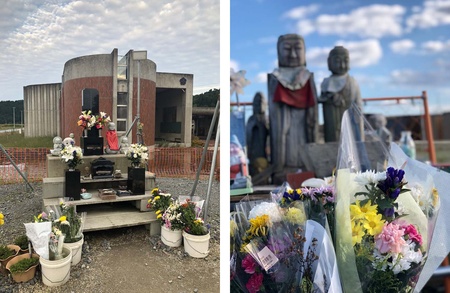
I talked to someone in a cafe at Tokyo Station about how depression and loneliness are a big problem in the population.
I saw their workers stay in their offices late into the night, and several of them return by train at night exhausted and sleeping standing or sitting.
I learned about my roots, accessed my family tree and the Koseki, visited the family cemetery, heard numerous stories about my ancestry and was moved by them.
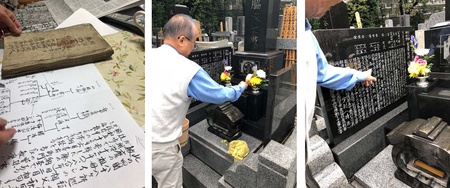
All this in 15 days.
As I boarded the return flight I remember feeling like a part of my heart was leaving. And the tears began to fall down my cheeks without being able to contain them. I no longer felt like a name , I no longer felt like an intruder, I no longer felt disqualified. I felt complete. I felt found. I felt like family .
The purpose
Eight months have passed since I returned from Japan. There was something else he had to accomplish.
I arrived 10 minutes before the indicated time. I sat in the last row. I looked around. They all seemed to know each other from the way they chatted. My hands felt cold. I looked at the folder they gave me upon arrival, which had the title “First Nikkei Symposium – Paraguay 2019”.
At that point I heard someone tell me:
– Akita-san?
– Hai – I managed to respond.
– Aderante. Purimera fira – he told me with Japaneseized Spanish and indicated that I should follow him.
I swallowed. When I arrived, he showed me where I should sit and gave me a slight bow. “Arigatou gozaimasu,” I said with a nervous smile. And I sat down. I was in the line of those who were going to speak.
An hour later I went on stage to share my story to an audience that included the then Ambassador of Japan in Paraguay Naohiro Ishida, leaders of the different associations and young Nikkeis.
I grabbed the microphone. Breathe deeply. I started my talk saying:
“If you told me a year ago that I was going to speak at a Nikkei Symposium, I wouldn't have believed you. What's more, a year ago I didn't even know how to write my name in Japanese. When I arrived I sat in the last row and for me it is so representative that from there they invited me to go to the first places. I used to be that Nikkei who only looked from afar. But today I am standing here in front of you to tell you that when someone decides to be a bridge of connection, the impact that it can have on others is incredible.”
After my return from Japan, several truly surprising things happened to me, considering that I was a complete outsider a year ago: interviews in the media, including a magazine cover with other prominent Nikkei women; that one of the leading sensei in Japan in the art of dressing kimono (kitsuke) has taught me and put on my first kimono; being secretary of the Gaimusho Nikkei Alumni Association; shaking hands with Minister Abe after his first visit to Paraguay; be invited to Embassy events; being the master of ceremony for the Kimono Show in the presence of a packed auditorium, among other details.
Definitely more than one Nikkei in the community will have said: “Who is this girl and where did she come from?” Yes, I can understand that. It was a meteoric exhibition. I was always behind, ninja mode. Hidden. But when I returned from Japan I understood that, like me, there were also several Nikkeis who could relate to my story, so I decided to expose myself.
My purpose is to encourage others to also look for the piece of their puzzle; to show that Japan has a lot to reveal. To tear down walls and build bridges so that others can also cross.
What drives me is that there is another Naru out there that I want to help.
© 2021 Narumi Akita


